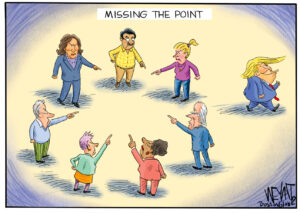Will the Post-DNC Pivot on Palestine Hurt Harris?
With two months until the election, the party thinks its Gaza problem is in the rear-view. But what if objects in the mirror are closer than they appear? What effect will Kamala's turn to the right have on her this election cycle? Graphic by Truthdig. Images sourced via AP Photo.
What effect will Kamala's turn to the right have on her this election cycle? Graphic by Truthdig. Images sourced via AP Photo.
The Democratic Party is sending a clear message to advocates for Palestine — whether or not you get in line, we don’t need you. It’s a strange position from the institution when a clear majority of the party faithful endorse at least a ceasefire in Gaza. But with the elevation of Vice President Kamala Harris as the top nominee in November, enthusiasm that was lacking under President Joe Biden has returned. There’s no need to give anything to a section of the base that wants an end to the war.
“It’s all the same,” Minnesota Anti-War Committee member Ashley Taylor-Gougé told the New York Times during the DNC. “There have been no changes made, there have been no statements made that are in line with what we want to see happen.”
Early attempts to confront Harris over her complicity in the Biden administration’s policy — attempts that carried with them the hope that the vice president would take the opportunity to break with the president — were unsuccessful. Instead, Harris’ response, telling two Muslim women at a Michigan rally, was “If you want Donald Trump to win, then say that. Otherwise, I’m speaking.” The comments were so popular with her followers that they’ve spawned T-shirts, mugs and memes.
Since her speech at the DNC, Kamala Harris’ public comments on Palestine have tilted further right.
This shift in rhetoric from the Harris wing of the party, initially seen as more vocally sympathetic to the plight of the Palestinians, was evident during the party’s convention in Chicago in August. Before Harris was the nominee, a protest movement for Palestine — expecting Biden to be up for re-election — planned to flood the streets of Chicago. Organizers expected 30,000 to 40,000 supporters, they said, but the actual turnout was far lower, around 10,000 at most. That amount of people wasn’t going to change things, especially without disruption of the convention itself.
Organizers with the Uncommitted movement, voters who had refused to cast their ballot for Biden during the nominal primary and instead voted for a neutral position in protest of the president’s war policy, nonetheless attempted to extract concessions from the DNC. The party gave them a panel on Gaza — off the floor — but refused a request to have a Palestinian American speaker, Georgia state Rep. Ruwa Romman, address the delegates for two minutes in a preapproved speech. Even this minor concession was seen as too much. And in her address to the convention, Harris sounded a defiant, bellicose note on the conflict, repeating pro-Israel talking points on the war before delivering a sideswipe of an acknowledgement of Palestinian pain roughly analogous to RNC remarks by George W. Bush in 2004.
Since her speech at the DNC, Harris’ public comments on Palestine have tilted further right. She has blamed Hamas for the actions of the Israeli military and called for their defeat and international censure even as Israel intensifies its attacks on Gaza and, now, on the West Bank. After six hostages were found dead in Gaza, Harris made clear that there’s no potential peace deal that involves the most powerful entity in the territory. “Hamas is an evil terrorist organization,” she said. “The threat Hamas poses to the people of Israel — and American citizens in Israel — must be eliminated and Hamas cannot control Gaza.”
Comments like these are counterproductive to a peaceful resolution and show that for Harris, as with Biden, there’s no solution in the territory that involves both sides. It’s the kind of commentary that puts all responsibility on the less powerful actor and encourages the aggressor to pursue violence with the same blank check, from administration to hypothetical administration.
Harris’ willingness to push back against the base’s pro-Palestine lean comes from her knowledge that most liberal and left-leaning voters will swallow their disgust over her support for a genocide in November. No one who was a Harris voter before her vocal support for the war is likely to be turned off enough to stay home. The threat of Trump is too great, goes the thinking; there will be time to push her on Gaza later. That is, once voters have no leverage.
The other main reason the campaign isn’t so concerned with losing some Palestine-focused voters on the margins is that the Democrats have closed the enthusiasm and volunteer gaps. As I wrote in May, Biden’s Israel policy damaged him among the party base, specifically among young volunteers that would need to go out and door knock and get out the vote. But that’s not a concern for Harris. Within a week of becoming the Democratic nominee, the vice president had 170,000 new volunteers. Thousands continue to sign up at rallies and across battleground states. A recent Gallup poll shows 78% of Democrats are excited to vote for Harris as opposed to 64% of Republicans who feel that way about Trump.
No one who was a Harris voter before her vocal support for the war is likely to be turned off enough to stay home.
It’s all adding up to yet another election cycle where the Palestinian people are at best ignored, if not vilified, by both parties. There’s no reason to expect anything from the Republicans. Trump uses “Palestinian” as a slur and is principally responsible for the hardline pro-Israel policies in place when Biden took office (policies the current president, to the extent he understands them, supports). Biden has been the worst Democratic president for Palestine in living memory.
Anyone looking to Harris for a better option is likely to be disappointed. Her rhetoric has made clear she has no interest in changing course. The question is, what are pro-Palestine voters able to do about it?
Your support matters…Independent journalism is under threat and overshadowed by heavily funded mainstream media.
You can help level the playing field. Become a member.
Your tax-deductible contribution keeps us digging beneath the headlines to give you thought-provoking, investigative reporting and analysis that unearths what's really happening- without compromise.
Give today to support our courageous, independent journalists.








You need to be a supporter to comment.
There are currently no responses to this article.
Be the first to respond.